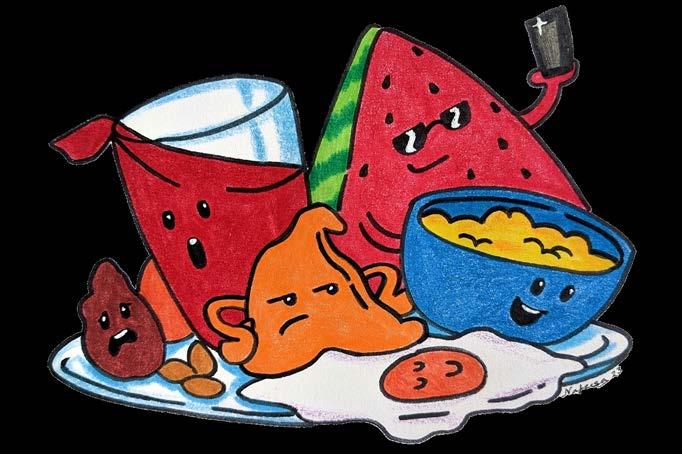
3 minute read
Ramadan Rumble: Which Iftar will come out on top?
participants named some sort of fruit, with some citing ‘fruit platters’ and others drooling over specific fruit dishes such as the Egyptian Khoshaf. But for most, the queen of fruits was easily Miss Watermelon. When asked why she was a fan favourite, one participant replied, “THE BEST – so refreshing.” Watermelons store over 80% of water which keeps tabs on dehydration. And somehow, watermelons seem sweeter during Ramadan. It’s almost as if she knows she’s the it-girl of the season.
[3] of this sweet scarlet punch brings forth memories of fasting.
Advertisement
[1]

Dates. That should come to nobody’s surprise. It is highly likely that you won’t find dates in the markets this month since most of the bulk wholesale packs are stacked in my fridge. Ten out of ten of the participants listed dates somewhere on their list, with seven out of ten admitting that it is their number one most satisfying iftar item. Walnut stuffed dates were also a popular alternative among respondents.
‘Tis the season to be holy. All your Muslim friends are fasting. There is an eerie quiet on Eastern Avenue at sunset because many have already left campus, keenly awaiting iftar time. And when the Azaan – call to prayer – resounds, it’s time to feast on your favourite oncea-year dishes.
It’s about time we shine a spotlight on some of these deserving iftar items that make most Muslims weak at the knees. While I do have much confidence in my own tastebuds, for the sake of democracy I’ve asked ten USyd students to provide their hot takes on their top iftar preferences. Their responses have been tallied and contribute to this list, ranked in order of ‘Mmm that’s good’ to ‘Ahh I have totally ascended’. [5]
Coming in piping hot at number five is none other than the humble soup. One participant made the health conscious statement - “lentil soups are really replenishing and fulfilling,” while another opted for the more blatant remark - “love that shit.” Lentil soups have been a staple in iftars for centuries, often served alongside assorted meats and vegetables. In Arab iftars, lentil soups (Shorbet Adas in Lebanon and Mercimek Corbasi in Turkey) are rich, creamy, and hearty. In Bangladesh we find another soup-er traditional dish, Halim. More akin to a stew, this curried goodness served with a sliver of lemon and dash of garlic will guarantee a sigh of contentment from any cultured Muslim.
[4]
While we’re on the healthy trend, we must reserve a place for our favourite high vitamin, non-guilty pleasure – fruits. Almost all the surveyed
If you do not have fried goods on your platter after a long day of fasting, you are either lying to yourself, a vegan, or built like Michelle Bridges. In terms of oil quantity, South Asian iftars could compete with McDonalds. Deep fried novelties like Chicken Samosa, Pakora, Beef Patties, and Beguni leave you feeling whole. Besides, a lot of Muslims burn it off through the 20 rakah Taraweeh (prayer) after iftar, that help expend those extra calories gained.
[2]
Contrary to popular belief, water is criminally underrated during Ramadan. Most Muslims opt for its bejewelled cousins - Tang cordial, mango smoothies, and strawberry milkshakes. But there is just one beverage that reigns above all. To some it tastes like heaven, to others cough syrup, but like caviar, it is truly an acquired taste. Rooh-afza, arguably the most Ramadan drink there is. Originally from Pakistan, the very scent
But why dates? One participant summed it up beautifully, writing, “Slay”. They later elaborated, “dates really are great for all the sugar lost during the day. They’re also Prophet approved.”. The significance of dates in Islam harks back to the time of Prophet Muhammad (PBUH) who is noted to have broken his fast with dates and water. This is considered Sunnah, or a model of behaviour for Muslims to follow. If you don’t have a date at the sound of the Azaan, your Mum’s coming for ya.
As flawless as this list is, it is of course difficult to rank food items that we are lucky enough to see at our tables. Ramadan is a time of gratitude for what we do have, and a time to think of others less fortunate. So, this Ramadan, practice giving thanks, gift your Muslim friends a watermelon, and for god’s sake, don’t let your intrusive thoughts pop the “not even water?!” question.









